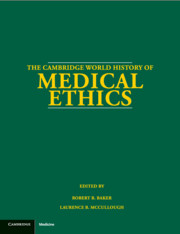Book contents
- Frontmatter
- PART I AN INTRODUCTION TO THE HISTORY OF MEDICAL ETHICS
- PART II A CHRONOLOGY OF MEDICAL ETHICS
- PART III DISCOURSES OF MEDICAL ETHICS THROUGH THE LIFE CYCLE
- PART IV THE DISCOURSES OF RELIGION ON MEDICAL ETHICS
- 9 The Discourses of Hindu Medical Ethics
- 10 The Discourses of Buddhist Medical Ethics
- 11 The Discourses of Confucian Medical Ethics
- 12 The Discourses of Early Christian Medical Ethics
- 13 The Discourses of Orthodox Christian Medical Ethics
- 14 The Discourses of Roman Catholic Medical Ethics
- 15 The Discourses of Protestant Medical Ethics
- 16 The Discourses of Jewish Medical Ethics
- 17 The Discourses of Islamic Medical Ethics
- PART V THE DISCOURSES OF PHILOSOPHY ON MEDICAL ETHICS
- PART VI THE DISCOURSES OF PRACTITIONERS ON MEDICAL ETHICS
- PART VII THE DISCOURSES OF BIOETHICS
- PART VIII DISCOURSES ON MEDICAL ETHICS AND SOCIETY
- Appendix: Biographies: Who Was Who in the History of Medical Ethics
- Bibliography
- Index
14 - The Discourses of Roman Catholic Medical Ethics
from PART IV - THE DISCOURSES OF RELIGION ON MEDICAL ETHICS
Published online by Cambridge University Press: 28 May 2012
- Frontmatter
- PART I AN INTRODUCTION TO THE HISTORY OF MEDICAL ETHICS
- PART II A CHRONOLOGY OF MEDICAL ETHICS
- PART III DISCOURSES OF MEDICAL ETHICS THROUGH THE LIFE CYCLE
- PART IV THE DISCOURSES OF RELIGION ON MEDICAL ETHICS
- 9 The Discourses of Hindu Medical Ethics
- 10 The Discourses of Buddhist Medical Ethics
- 11 The Discourses of Confucian Medical Ethics
- 12 The Discourses of Early Christian Medical Ethics
- 13 The Discourses of Orthodox Christian Medical Ethics
- 14 The Discourses of Roman Catholic Medical Ethics
- 15 The Discourses of Protestant Medical Ethics
- 16 The Discourses of Jewish Medical Ethics
- 17 The Discourses of Islamic Medical Ethics
- PART V THE DISCOURSES OF PHILOSOPHY ON MEDICAL ETHICS
- PART VI THE DISCOURSES OF PRACTITIONERS ON MEDICAL ETHICS
- PART VII THE DISCOURSES OF BIOETHICS
- PART VIII DISCOURSES ON MEDICAL ETHICS AND SOCIETY
- Appendix: Biographies: Who Was Who in the History of Medical Ethics
- Bibliography
- Index
Summary
INTRODUCTION
Pope Pius Ⅻ's (b. 1876; r. 1939–1958) address in 1944 to the Italian Medical-biological Union of St. Luke, an exclusively Roman Catholic audience, is a concise summary of many aspects of Roman Catholic medical ethics as they had evolved up his time, which he supported philosophically by arguments from natural law, explicated theologically from Scripture and Tradition, and elaborated with deep pastoral concern (Papal Teachings 1960, 51–65). He introduced his allocution with an anecdote: “Your presence, beloved sons, brings to mind a scene enacted in Paris in December, 1804. In the Grand Hall of the Louvre, when numerous delegations crowded to render homage to the Vicar of Christ and to receive his blessing, five young doctors …were introduced to the Sovereign Pontiff, Pius Ⅶ. The Pope could not disguise a reaction of surprise: ‘Oh!’ he said laughingly, ‘Medicus pius, res miranda!’”
This exclamation of a pope 140 years earlier – “A pious physician – what an amazing thing!” – echoed an adage from the Middle Ages, “Ubi tres medici, ibi duo athei” (“Where there are three physicians there are two atheists”). The warnings of the lure of scientific naturalism as a danger to which physicians are especially susceptible have been reiterated throughout the history of the Church. Furthermore, that medicine may be employed as much to evil as to good ends had been a concern of the Church Fathers (see Chapter 12) and has been a focal point of Roman Catholic medical ethics.
- Type
- Chapter
- Information
- The Cambridge World History of Medical Ethics , pp. 218 - 254Publisher: Cambridge University PressPrint publication year: 2008

